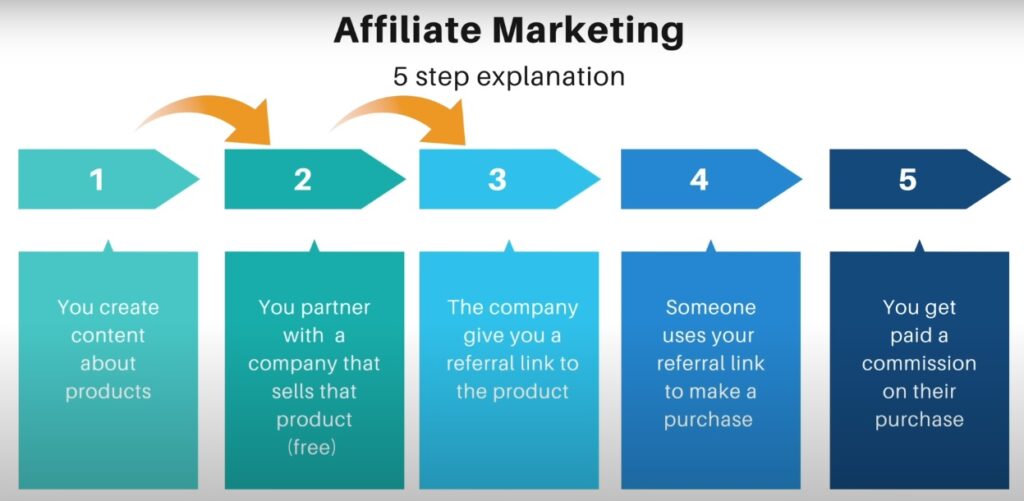Ever wondered how to make money online without creating a product or handling customer service?
Affiliate marketing is the perfect way to start. This business model lets you earn commissions by promoting products or services that others create.
It’s an opportunity to build income streams with flexibility and low startup costs.
But how do you begin? Let’s explore how to get started with affiliate marketing? even if you’re working with no budget.
Affiliate Marketing Business
What you’re doing: Promoting other people’s products and earning commission.
WHAT YOU NEED

1. What is Affiliate Marketing?
Affiliate marketing is a type of online business where you earn money for promoting products or services.
You act as a bridge between the company offering the product and the customer who buys it. When someone uses your unique link to make a purchase, you earn a small commission.
This model works because it benefits all three parties:
–Merchants gain new customers.
-Affiliates (that’s you!) earn commissions.
-Consumers discover products or services they need.
It’s a simple but powerful way to earn online.
2. How Does Affiliate Marketing Work?
Just think about what you love most. Where do your interests lie? Is it in tech, sports, fashion, fitness, health, pets, DIY, or something else entirely? Whatever it is, that’s your niche.
Choosing a niche is super important because it helps you focus on something you’re genuinely passionate about. Once you’ve decided on your niche, the next step is to dive deeper and start building your strategy around it.
Here’s how the magic happens:

For example you love dog related stuff (Ha Ha..everybody loves Dogs), Just Google “Affiliate products for dog products”, you will get bunch of options

#2. Get Your Unique Affiliate Link: Now that you’ve chosen your niche, find an affiliate program that fits your niche, pick specific products to promote, and apply to become an affiliate. You need approval from merchant.
Once approved, you’ll receive a unique affiliate link that tracks all the traffic and sales you drive to the merchant’s site.
#3. Promote the Product: Share your affiliate link through your blog, social media, email, or any other platform you use.
#4. Earn Commissions: When someone clicks on your link and makes a purchase, you earn a commission. Cha-ching!
3. Promoting Affiliate Links Without Spending Money
The best part? Promotion doesn’t have to cost a dime.
The key is to create content related to the product you’re promoting. Your content should solve a problem or provide value.
For example, if your product helps improve a dog’s health, create content like “5 Tips to Boost Your Pet’s Health” or “How to Keep Your Dog Happy and Healthy.”
Content can take any form: blogs, emails, videos, webinars, courses, reviews, or anything else that resonates with your audience.
Here are some free ways to share your affiliate links and get started:
Start a YouTube Channel: Post tutorials, unboxings, or honest reviews about the product.
Use Pinterest: Create eye-catching pins that link to your reviews or guides. Pinterest is a goldmine for free traffic, especially for new bloggers.
Share in Online Groups: Be active and helpful in forums or social media groups, and share your links when it feels natural and relevant.
Write Articles: Publish on platforms like LinkedIn, Blogger, or even create a free website using tools like Canva or Google Sites.
Use Social Media Platforms: You can post content on any social media platform like Facebook, Instagram, tiktok,..whatever you comfortable in
Leverage Your Email List: Share your affiliate links with your subscribers in a helpful, non-spammy way.
The goal is to provide value first, your audience will appreciate it, and the commissions will follow.
Read More: Make Videos That People Actually Watch
4. Benefits of Affiliate Marketing
Low Startup Costs: You don’t need to create a product or hold inventory. Just sign up and start promoting. All you need is a computer, an internet connection, and a bit of time to get started.
Passive Income: Earn even while sleeping. Once you’ve set up your affiliate links and content, you can continue to earn commissions on sales made through your links, even when you’re not actively working. This passive income potential is one of the key reasons why many people are drawn to affiliate marketing.
Flexibility: Work from anywhere, anytime. This flexibility allows you to create a work-life balance that suits your lifestyle, making it an ideal choice for digital nomads and stay-at-home parents alike.
Wide Range of Products and Services: Another benefit of affiliate marketing is the vast array of products and services you can promote. From fashion and beauty to technology and finance, there’s something for everyone. This variety allows you to choose niches that align with your interests and expertise, making the marketing process more enjoyable and authentic.
Scalability:
Affiliate marketing is highly scalable, meaning you can grow your business and increase your earnings over time. As you gain more experience and refine your strategies, you can expand your reach, promote more products, and attract a larger audience.
Global Audience: Reach people all over the world.

5. Choosing the Right Affiliate Program
-High Commissions:
Look for programs that offer generous commissions.Some programs offer a flat rate per sale, while others provide a percentage of the sale amount. Additionally, some programs may offer recurring commissions for subscription-based products.
-Reliable Payments:
Ensure the program has a good track record of paying affiliates on time. Understanding the payment terms of an affiliate program is essential. How often will you be paid? What is the minimum payout threshold? Are there any fees associated with payments?
-Quality Products:
When choosing an affiliate program, it’s crucial to promote products or services you believe in. Your audience trusts your recommendations, and promoting low-quality or irrelevant products can damage that trust. Take the time to research the products or services offered by the affiliate program.
-Support and Resources:
Support and resources from the affiliate program can make a significant difference in your success. Look for programs that offer marketing materials, training, and dedicated affiliate managers. These resources can help you optimize your promotional efforts and overcome any challenges you may encounter.
6. Common Mistakes to Avoid
However, many aspiring affiliate marketers make common mistakes that hinder their success. Here’s how to avoid common mistakes:
-Overloading with Links: Too many links can feel spammy. Use them sparingly.
-Ignoring SEO: Optimized content gets more traffic. Learn the basics of SEO.
-Choosing the Wrong Niche: Pick a niche you’re passionate about to stay motivated.
Conclusion: Are you ready for Affiliate Adventure?
By understanding the basics, choosing the right programs, and creating valuable content, you can build a successful affiliate marketing business.
So, what are you waiting for? Dive in, start promoting, and watch the commissions roll in. Happy marketing!
Bonus Tip:
Affiliate marketing is powerful but if start building email list then it becomes gold mine.
If Instagram, Facebook, or any platform changes its rules, your reach could drop overnight… or worse, your account could get suspended.
Owning an email list means having direct access to your customers, whenever you need it. It’s your safety net.
Want to build a list that matters?
Check out Free Webinar to get started with email Marketing
